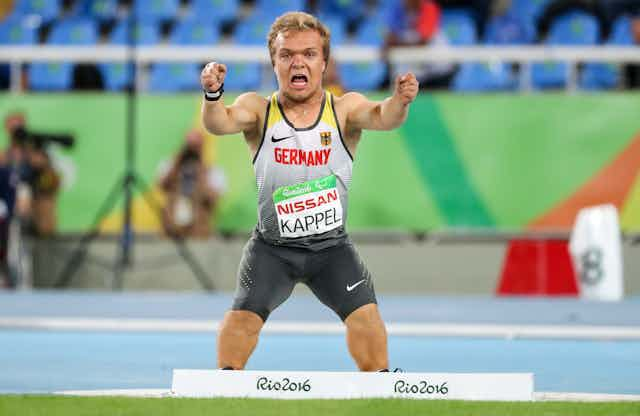We talk a lot about legacy of sporting events, in terms of increasing participation and improving health, but what about the societal legacy? The London Paralympic Games was heralded as a big step forward for disabled sport, but has the opportunity to address broader social issues been taken? What do the athletes themselves do to address issues facing the disabled when the spotlight is on them?
In our recent study with 36 elite disabled athletes who were sampled to ensure a variety of experiences (male and female athletes from different sports, congenital and acquired impairment), all participants identified as being sporting activists. This meant that they challenged what they saw as inequalities in sport. For example, disabled athletes feel that to reach their full potential and win more medals at the Paralympics they need the same access to high-quality coaches that non-disabled athletes have.
Our study also found that only seven of the disabled athletes were politically active outside of sport. They sought to highlight and challenge the difficulties disabled people regularly face in society. This included challenging the cuts to disabled people’s living allowance (first mooted in 2013) and negative views some people have about disability.

What is stopping more elite disabled athletes from taking the leap from sporting activism to political activism? Our research showed that 25 of the 36 interviewees felt as though there was little need for it – equality is already achieved. Ten felt it would put off sponsors and organisers if they were outspoken and 27 thought the emotional effort of being politically active would distract from their training and performance. But the people who are politically active disputed this. They had not only secured sponsorship, but also won medals at world championships and the Paralympics. They had seen first hand that disabled people faced many problems that were not of their own making but which damaged their quality of life. As one athlete said:
When you really look outside sport and the comfortable life it gives you, what you see is unfortunately a lot of misery and difficulties for disabled people. None of it our fault, very little anyway. The problems largely fall at the door of society, for not thinking we can excel at work, for not adapting buildings, people staring at disabled people when they shop in a supermarket, a lack of accessible transport, bad stadiums, welfare cuts, cruel jokes, and even physical violence … People are suffering, that’s the reality of it. And if I can use my identity as an athlete to help change things, I will and do.
In retrospect
All athletes retire from elite sport at some stage. What then do the views of retired athletes tell us about how their role is viewed on reflection? The eight athletes who had retired felt that sport kept them in something of a bubble and buffered them from the realities that they would face when they left competitive sport.
When they retired they struggled to get a job, found accessing transport and buildings difficult, experienced insults and hate crime and became depressed. To help with the transition from being an elite athlete to a retired athlete, seven of those eight retired would urge more athletes to become politically active while in the spotlight. As one person said:
Retiring from competitive sport hit me psychologically. I was miserable a lot. My impairment was a route into professional sport, but now society treats me like a second-class citizen. I was told, by strangers that I’m a drain on society and would be better off dead. And if I could offer one bit of advice to athletes in sport now it would be: don’t believe all is rosy for disabled people. It isn’t. When you retire, you’ll find this out pretty quickly and retirement will be even more difficult because of the discrimination we face. Start being politically active as an athlete, or at least aware. Use your status as an athlete to bring attention to disability rights if you can.
There is no requirement for athletes to adopt a political role; it’s not something all athletes will want to do. But perhaps, with the spotlight being on disabled sport for two weeks during the Paralympics, it’s the right time for athletes, sporting organisations, disability rights groups, the disabled public and researchers to have a debate about what athletes might do to challenge oppression. We also need a debate about how to ensure that the barriers that prevent keen spokespeople in sport from publicly talking about the many difficulties and inequalities disabled face are removed.

